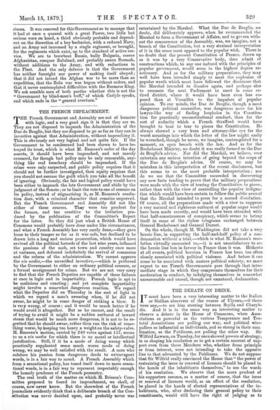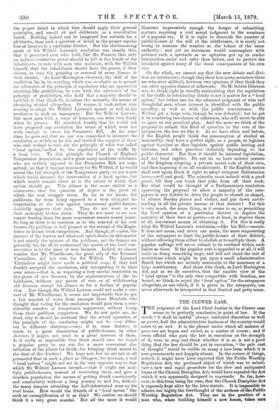THE DEBATE ON DRINK.
I T must have been a very interesting matter to the Italian or 'Sicilian observers of the course of Ulysses,—if there were any,—to see him steering between Scylla and Charyb- dis. And it is in the same way an interesting matter to observe a debate in the House of Commons, when Asso- ciations so powerful as the various Temperance and Tee- total Associations are pulling one way, and political wire- pullers so influential as individuals, and so strong in their corn bination, as the Publicans, are pulling the other way. Sir Wilfrid Lawson, on Tuesday, for once showed powers of strategy, in so shaping his resolution as to get a certain amount of sup- port even from those Members who, whether from principle or from interest, were not intending to take the opposite line to that advocated by the Publicans. We do not suppose that Sir Wilfrid really convinced the House that " the power of restraining the issue or renewal of licences should be placed in the hands of the inhabitants themselves," to use the words of his resolution. We observe that the more prudent of his supporters assume, as a matter of course, that the issue or renewal of licences would, as an effect of the resolution, be placed in the hands of elected representatives of the in- habitants, who, after declaring their general policy to their constituents, would still have the right of judging as to the proper detail in which they should apply their general principles, and would sit and deliberate as a consultative board. Nothing indeed can be imagined less suitable for a plebiscite, than such a question of detail as the proper regula- tion of licences in a particular district. But the electioneering merit of Sir Wilfrid Lawson's resolution was exactly this, that it. permitted men who hold, like Mr. Forster, that only an indirect restrictive power should be left in the hands of the inhabitants, to vote with men who maintain, with Sir Wilfrid himself, that the inhabitants should have the power, if they choose, to veto the granting or renewal of every licence in their district. As Lord Hartington observed, the skill of the resolution lay in its wording, which was so elastic as to permit the advocates of the principle of regulation who are opposed to anything like prohibition, to vote with the advocates of the principle of prohibition, who hold that a majority should be entitled, if they think fit, to refuse the minority the means of obtaining alcohol altogether. Of course, it took rather nice steering to adapt Sir Wilfrid Lawson's speech as well as his resolution to such an emergency. But Sir Wilfrid Lawson, like most men with a sense of humour, can steer very finely when he pleases. He admitted frankly that he would not have proposed any resolution the terms of which were not wide enough to cover his Permissive Bill. At the same time, he gave out that no one was compelled to interpret the resolution as widely as he did, and invited the support of those who only wished to vote for the principle of what was called "local option,"—that is, the regulation of the traffic by a local vote. To this principle the Church of England Temperance Association, and a great many moderate reformers who are entirely opposed to the Permissive Bill, are com- mitted; so that it became necessary for Sir Wilfrid, if he would secure the full strength of the Temperance party, to use words which would demand the intervention of a local option, but which would remain silent as to the extent to which that option should go. This silence is the more skilful as a manceuvre, that the question of degree is the pivot on which the real struggle turns. So far as we know, the publicans, far from being opposed to a very stringent in- terpretation of the rule against unnecessary public-houses, decidedly approve that rule. They do not want to see their monopoly broken down. They do not want to see cus- tomers leaving them for more convenient resorts nearer home. So long as there is no question as to the renewal of his own licence, the publican is well pleased at the refusal of the Magis- trates to license fresh competitors. And though, of course, the interest of the brewer and wholesale spirit-dealer in this matter is not exactly the interest of the publican, yet the former are generally too far off to understand the merits of the local con- troversies as to the issue of new licences. Indeed, we almost wonder that Mr. Wheelhouse, the great ally of the Licensed Victuallers, did not vote for Sir Wilfrid. The Licensed Victuallers might have made a political coup, if they had frankly accepted the resolution, only interpreting it in their own sense,—that is, as requiring a very careful restriction on the grant of new licences, by the representatives of the in- habitants, without any power of veto or of withdrawing old licences except for abuses or for a decline of popula- tion. But though Sir Wilfrid Lawson could not make a con- vert of Mr. Wheelhouse, it seems not improbable that he got a fair number of votes from amongst those Members who thought that voting for the resolution would gain them a con- siderable number of temperance supporters, without losing them their publican supporters. We do not quite see, in- deed, why it should be assumed that the actual operation of the principle of the resolution might not be very differ- ent in different districts,—why, if in some districts it tends to a great diminution of public-houses, in other districts it might not tend to a great increase of them. Is it really so impossible that there should ever be found a popular party to cry out for a more convenient dis- tribution of the places for drink, for bringing drink nearer to the door of the drinker ? We hope not, but we are not at all persuaded that in such a place as Glasgow, for instance, a real "local option" might not act in the very opposite way to that which Sir Wilfrid Lawson intends„—that it might not mul- tiply public-houses, instead of restricting them, and give a drunken population the 'means of getting drunk conveniently and comfortably without a long journey to and fro, without the many dangers attending the half-intoxicated man on his road home. How would the friends of a "local option" like such an exemplification of it as this"? We confess we should think it a very great scandal. But all the more it would illustrate impressively enough the danger of submitting matters requiring a cool moral judgment to the nominees of a popular cry. If it is right to diminish the number of public-houses at the will of the inhAbitants, it is surely not wrong to increase the number at the behest of the same authority ; and yet no statesman would contemplate with patience such a spectacle as an agitation got up to render intoxication easier and safer than before, and to protect the drunkard against many of the worst consequences of his own vice.
On the whole, we cannot say that the new debate and divi- sion are satisfactory, though they show how many members there are who steer skillfully between two opinions, if they think they can unite opposite classes of adherents. Sir H. Selwin Ibbetson was, we think, right in steadily maintaining that the regulation of the traffic in intoxicating drinks is not a matter for a "local option," but rather one for the educated judgment of wise and thoughtful men, whose interest is identified with the public morality, as well as with the public convenience. Sir Wilfrid got a large vote, though he was defeated ; but he got it by combining two classes of adherents, who will never be able to agree on any practical plan. And the more we think of the proposal to submit this kind of question to the vote of the ratepayers, the less we like it. As we have often said before, if the English people think the consumption of alcohol an immorality, they have a perfect right, as a people, to legislate against it,—just as they legislate against public betting and lotteries, and other practices definitely degrading to the public character. But then it should be national legislation, and not local caprice. Do not let us have minute corners of the kingdom adopting a private moral code of their own, and then imposing it on all recalcitrants. H the English nation shall ever again think it right to adopt stringent Sabbatarian laws,—well and good. The minority must submit with a good grace, till they can break that yoke from off their neck. But what would be thought of a Parliamentary resolution approving the proposal to allow a majority of the rate- payers in any district to drive the people to church or chapel, to silence Sunday pianos and violins, and put down novel- reading in all the private houses of that district? Yet this is very much the same thing, as it seems to us, as permitting the local opinion of a particular district to deprive the minority of their beer or porter,—or at least, to deprive them of all convenient means of obtaining it. For this is really what Sir Wilfrid Lawson's resolution,—like his Bill,—means. It does not mean, and never can mean, the mere empowering of the ratepayers to limit the public-houses of their district, without allowing them either to abolish or to multiply them. A popular suffrage will never submit to be confined within such limits as these. If the popular vote is appealed to at all, it will insist on doing something large, and will not stand the sort of restrictions which might be put upon a small administrative Board, but which are entirely unsuitable to the nominees of a large constituency. And those who think, as Lord Hartington did, and as we do ourselves, that the smaller view of the "local option" is the only view compatible with freedom, are bound, we think, to reject the "local option "for the ratepayers altogether, as one which, if it is given to the ratepayers, can never afterwards be interpreted in that limited and petty sense.



































 Previous page
Previous page